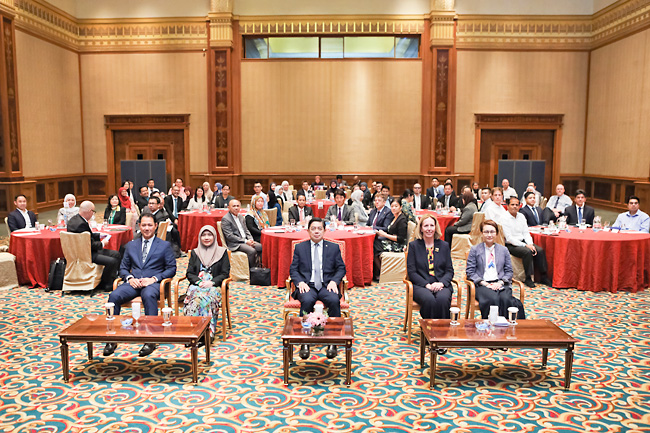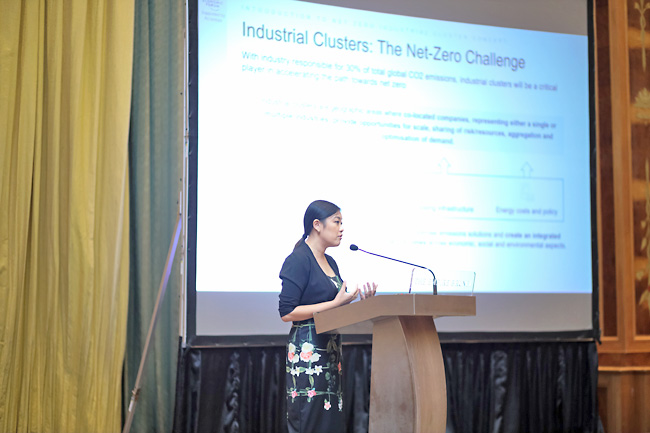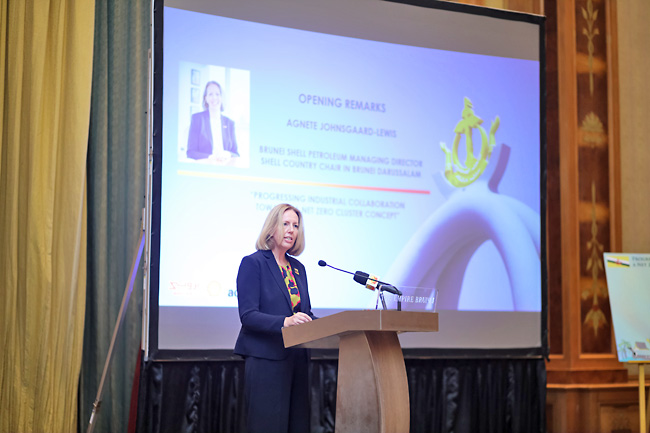Officials from energy players from upstream, midstream, downstream, and utility companies alongside government departments and agencies gathered to discuss and identify opportunities, challenges, and enablers to transition towards the concept of a net-zero industrial cluster in the workshop on ‘Progressing Industrial Collaboration towards a Net-Zero Cluster Concept’ organised by Brunei Shell Petroleum (BSP) yesterday.
Minister at the Prime Minister’s Office and Minister of Finance and Economy II Dato Seri Setia Dr Awang Haji Mohd Amin Liew bin Abdullah who is also the Co-Chair of the Brunei Darussalam National Council on Climate Change attended the event held at the Indera Kayangan Ballroom, The Empire Brunei.
Permanent Secretary (Wawasan) at the Prime Minister’s Office (PMO) Pengiran Hajah Siti Nirmala binti Pengiran Haji Mohammad; Acting Permanent Secretary (Energy) at the PMO Pengiran Haji Jamra Weira bin Pengiran Haji Petra; BSP Managing Director and Shell Country Chair in Brunei Darussalam Agnete Johnsgaard-Lewis; and BSP Head of Energy Transition Shirley Sikun were also present.
The workshop was facilitated by consulting group Accenture, bringing together representatives from government agencies as well as industry players to discuss and identify opportunities toward a Net-Zero Industrial Cluster Concept.
In her welcoming remarks, Agnete Johnsgaard-Lewis recognises the collaboration between the private and public sectors in supporting the Sultanate’s sustainability and net-zero journeys.
“Collaboration is fundamental to unlock sustainable investment in energy transition solutions”.



“I believe that today’s workshop will set the stage for further dialogues between the public and the private sector on how we can collaborate to progress industrial decarbonisation and collectively thrive in the energy transition”, she added.
She highlighted, “The transition to a net-zero industrial cluster is a global initiative by the World Economic Forum, Accenture and Electric Power Research Institute launched at the 26th United Nations Climate Change Conference of the Parties to support industrial clusters in their path towards net-zero, while recognising and maximising economic competitiveness.
Globally, industry is responsible for almost one-third of global carbon dioxide emissions. The industrial clusters will be a critical player in the move towards net zero.”
She outlined that collaboration is fundamental to unlock sustainable investments in energy transition solutions. Brunei could benefit in three ways namely building a shared ecosystem of tailored decarbonisation technologies and operational talent in the cluster; coordinating collaboration with industry players and governments; and facilitate potential capital investment and joint infrastructure development.
The possible benefit can derive beyond just numbers, she said.
“It has the potential to boost in-country value and deliver economic benefits such as job creation and spin-off businesses.”
The one-day workshop aims to produce Insights and Recommendations Paper outlining key opportunities and challenges of a net-zero cluster concept in the Sultanate, with the intent that this will be shared amongst relevant stakeholders.
“We leveraged the diverse insights and experience from the participants to co-create the prospect of a lower-carbon industrial cluster in the Sultanate. We applied the lenses of partnership, policy, financing, and technology as these are key considerations for Brunei’s move to net-zero. As a Bruneian, it was inspiring to witness the shared sense of responsibility across agencies and sectors to support Brunei’s decarbonisation and sustainable development goals,” said Shirley Sikun. – James Kon


